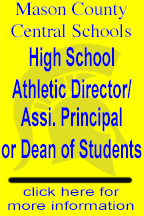 MCC Alumni Feature: Mike Hankwitz, a half century coaching college football.
MCC Alumni Feature: Mike Hankwitz, a half century coaching college football.
Spartan News is presented by Mason County Central Schools in partnership with Mason County Press. This special series of Spartan News features alumni of MCC.
By Rob Alway, Editor-in-Chief.
- Mason County Central Class of 1966
- Undergraduate Degree: University of Michigan
- Career Highlights: Defensive coordinator, Western Michigan University, University of Colorado, University of Kansas, Texas A&M, University of Arizona, University of Kansas, University of Wisconsin and Northwestern).
Mike Hankwitz is likely one of the most successful athletic professionals to graduate from Mason County Central High School. In 2020, Hankwitz, a 1966 graduate of MCC, retired as defensive coordinator at Northwestern University, following a 50-plus-year career that began as a graduate assistant coach at University of Michigan in 1970. His career then included serving as a defensive coordinator for seven different colleges including Western Michigan University, University of Colorado (twice), University of Kansas, Texas A&M, University of Arizona, University of Kansas, University of Wisconsin and Northwestern). His career also included winning over 400 games.
Hankwitz said he owes his love of football and coaching directly to his experiences at Mason County Central and the coaches who were a major part of his life.
“I can’t think of a better place to have grown up than Scottville,” Hankwitz said. “We were lucky to have lived in a community where it seemed everybody was your parent. We had great support from the teachers in the school like Duane Ingraham, Loren Dietrich, O’Neil ‘Boots” Newkirk, Arnold Carlson, Earl Keith, and many more.”
Loren Dietrich was the high school football coach while Duane Ingraham coached boys basketball and was also the drivers’ education teacher.
“Coach Dietrich and Coach Ingraham both had a major impact on my life and the choices I made. Because of them I wanted to coach high school sports. We would sit in Coach Dietrich’s classroom before school started and talk about his life experiences. We would also spend time in the gym shooting baskets.”
Hankwitz’s football experience began as the varsity football team manager when he was in eighth grade.
“I babysat Coach Dietrich’s kids. From there, I got to know him and he asked me to be the football team manager when I was in eighth grade. I attended being able to sit on the sidelines with the team, going to all the home and away games. I started to see how things were done on the team.”
Hankwitz was moved to the varsity team his freshman year. “We went 2-6 that year then we won the league championship for the next three years. It was just a great experience with my friends and teammates, along with the adults who were part of our community.”
His football experience got the attention of several colleges. He was recruited by Central Michigan University and Western Michigan University, among others, but he ultimately accepted the invitation from University of Michigan.
“In 1966 freshmen weren’t eligible to play on the main team. So, we would practice running defense and offense one week and then played as a scout/demonstration team the next week, running the plays the opposing team would run.”
Hankwitz played split end his freshman year. He was then moved to linebacker his sophomore year.
“I wasn’t a great player but I was learning,” he said. “Then, the summer of 1968 I was home working when the tight end coach called me and asked if I would play backup tight end. I just wanted to play and didn’t care what position I played. I got to start one game that season.”
In 1969, Bo Schembechler became head football coach at U of M.
“Coach Schembechler met with every player one-on-one and talked to us, asking what our plans were after college. I told him I had planned on becoming a high school coach. He asked if I had thought about being a graduate assistant. I had never thought about that option but decided to go that route. It really opened my eyes. I had always been predominantly on offense and they wanted me to be on defense. I got to learn the other side of football in depth. I was hooked. I continued to be a graduate assistant and thought that after a couple years of that, I would graduate and then get a job at a high school.”
Hankwitz was then recruited by former U of M offensive coordinator Jim Young, who had just accepted a head coaching job at University of Arizona. “He needed an assistant coach. So, in the fall of 1972, I accepted a position there and continued coaching for 51 years.”
In retirement, Hankwitz spends his summers living near Hamlin Lake and his winters in Arizona. He is an inductee in the Mason County Sports Hall of Fame (2005) and a board member of the Mason County Historical Society.
Growing up in Scottville, Hankwitz learned the game of football at McPhail Field, a recreation field owned by the city along State Street (US 10). Those familiar with the field know that it can frequently be wet because much of Scottville sits on clay. In 1998/1999, MCC constructed Spartan Community Field on the northwest corner of the school campus. While the new field was a major improvement compared to the field at McPhail, the land is still very wet. This meant the field needed to be crowned, to allow for water drainage. That crowning has limited the use of the field to mostly football and did not resolve all the wetness issues.
This spring, voters in the Mason County Central School District are being asked to decide on a bond proposal that includes much needed infrastructure updates at MCC including many athletic facilities. The $4 million in athletic facility improvements only represent a portion of the bond. They include several updates at Spartan Community Field including press box flooring replacement, new soccer field scoreboard, new team restroom building at the football/all-purpose field, additional parking at the baseball field, and new synthetic turf, along with drainage infrastructure at the all-purpose field. The $4 million in improvements account for about 12% of the $33.6 million bond proposal. Other athletic facility improvements, connected with specific building updates include middle school gym and locker room updates, renovations in A.O. Carlson Gymnasium, and improving the outdoor courts (Magic Square) at Scottville Elementary.
Though the $1.3 million synthetic turfing represents about 3.8% of the $33.6 million it has been a topic of conversation for many people in the community. Hankwitz said he has spent his most of his football career playing or coaching on synthetic turf and highly recommends it for several reasons.
“The turf today is much better than the initial turf,” he said. “Astroturf was like wired brush. Now it’s little beads and the impact is much closer to natural grass. The vast majority of colleges have it and it gets used a lot, not just by the main football teams but by intramural teams and several other sports such as soccer, field hockey, and lacrosse, just to name a few. The synthetic turf fields are so much better in inclement and cold weather compared to natural turf. I can see, especially in Scottville, where the current field is constantly wet and gets torn up easily. In the long run, synthetic turf would not only save the school district maintenance costs but will likely get used so much more than it currently does. It opens up so many more opportunities such as use by other sports. It will not just be a football field but a multi-use field instead.
“It just seems like it would be a good investment for the amount of use it could get from the community would mean it would pay for itself.”
Please consider helping to fund local news. Mason County Press and Oceana County Press are available for free thanks to the generous support of our advertisers and individuals. Three ways to help us: Venmo: @MasonCountyPress; Paypal: MasonCountyPress@gmail.com; Mail a check to PO BOX 21, Scottville, MI 49454.
This story is copyrighted © 2022, all rights reserved by Media Group 31, LLC, PO Box 21, Scottville, MI 49454. No portion of this story or images may be reproduced in any way, including print or broadcast, without expressed written consent.
As the services of Media Group 31, LLC are news services, the information posted within the sites are archivable for public record and historical posterity. For this reason it is the policy and practice of this company to not delete postings. It is the editor’s discretion to update or edit a story when/if new information becomes available. This may be done by editing the posted story or posting a new “follow-up” story. Media Group 31, LLC or any of its agents have the right to make any changes to this policy. Refer to Use Policy for more information.
































































.jpg)
